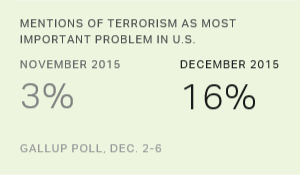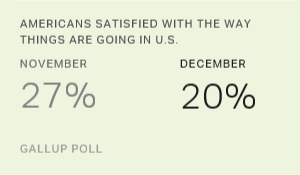Story Highlights
- Satisfaction with security from terrorism down 16 percentage points since 2015
- This year's drop follows a 10-point drop from 2014 to 2015
- Satisfaction with military strength and preparedness now at 59%
WASHINGTON, D.C. -- Americans' satisfaction with the nation's security from terrorism has significantly eroded for the second year in a row, with a majority now saying they are dissatisfied. More than two-thirds, 69%, said in 2014 that they were satisfied with the nation's security from terrorism, but that figure dropped to 59% a year ago and now has fallen to 43%.
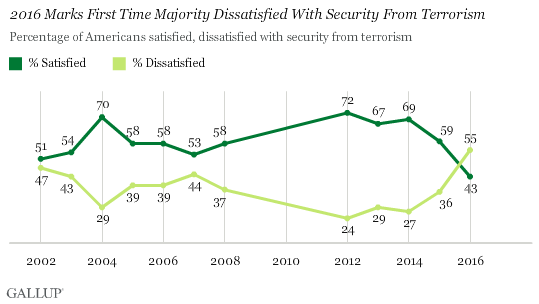
In recent years, security from terrorism has been one of the issues with which Americans have expressed the greatest satisfaction. From 2012 to 2015, it ranked in the top two of 16 dimensions concerning the state of the nation measured annually in Gallup's Mood of the Nation poll. With the slide this year to 43%, it now has a lower percentage satisfied than four other dimensions: acceptance of gays and lesbians (60%), military strength and preparedness (59%), quality of medical care (53%), and quality of the environment (53%).
The prior low point in satisfaction with security from terrorism was 51%, measured in January 2002, four months after the 9/11 terrorist attacks. Satisfaction remained at the majority level through 2008. Gallup did not ask the question from 2009 through 2011. After the U.S. military killed Osama bin Laden in May 2011, asking this question resumed in January 2012, and in that year, it reached a high point in the overall trend at 72%.
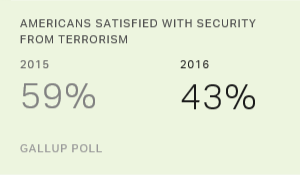
Declines in satisfaction over the last two years dovetail with the rise of the terrorism-sponsoring Islamic State group, or ISIS. Terrorist attacks linked to ISIS late last year in Paris and San Bernardino, California, weakened Americans' trust in the government's ability to protect its citizens and pushed "terrorism" to the forefront of the nation's most important problems.
President Barack Obama, criticized by Republicans for his handling of terrorism, has explicitly attempted to quell Americans' fears -- first in an Oval Office address four days after the San Bernardino shootings, and again in his State of the Union address on Jan. 12. In his State of the Union speech, he outlined steps the U.S. is taking to combat the threat, stating that "priority No. 1 is protecting the American people and going after terrorist networks."
Seniors, Midwesterners, Republicans Most Concerned
Although satisfaction has dropped over the past two years among every major demographic group, attitudes about terrorism show a strong political split, with only a quarter of Republicans (24%) and conservatives (24%) satisfied, compared with a majority of liberals (56%) and Democrats (51%). The partisan divide has grown significantly wider in the past two years: 66% of Republicans were satisfied in 2014, only 10 percentage points less than Democrats at the time (76%) and a higher percentage than the percentage of Democrats now.
Major splits also occur by region and age. Midwesterners (36%) and those aged 55 and older (35%) are among the least satisfied. Westerners (52%) and adults younger than 35 (53%) are the most satisfied.
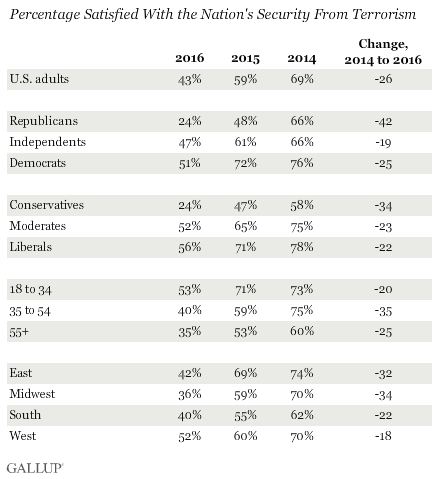
Satisfaction With Military Strength Also Drops
Satisfaction with the nation's military strength and preparedness -- another key measure of Americans' confidence in their national security -- has also fallen, from 69% last January to 59% now. Even with the drop, it still ranks second among the dimensions of the state of the nation that Americans are most satisfied with.
Among Republicans, 38% say they are satisfied, compared with 64% of independents and 72% of Democrats. Cutbacks in the numbers of Navy warships and Army soldiers have prompted GOP attacks over the past year asserting Obama and Democrats in Congress have allowed military strength to sink to dangerously low levels. Obama responded to the charges in his State of the Union address, calling them "political hot air."
Bottom Line
With the 2016 presidential campaign about to hit full speed and Islamic State terrorists having successfully executed attacks in the U.S. and abroad in recent months, it is inevitable that national security issues -- including both concerns about the U.S. military's capabilities and about the nation's ability to fend off terrorist attacks -- will be a major part of both parties' campaigns. Those recent attacks have clearly shaken Americans, who are much less satisfied than they were two years ago with the nation's security from terrorism and with the government's ability to prevent attacks. President Obama and Democrats in general have emphasized not overreacting to the Islamic State, including not alienating countries with large Muslim populations by linking ISIS to Islam. Republicans generally have pushed for stronger countermeasures, including tighter restrictions or a total ban on refugees from the Middle East.
Americans' views on what the U.S. should do to combat terrorism will heavily influence both the presidential and congressional elections this fall, and the election results could profoundly affect the outcome of the daunting national security challenges now facing this country.
Survey Methods
Results for this Gallup poll are based on telephone interviews conducted Jan. 6-10, 2016, with a random sample of 1,012 adults, aged 18 and older, living in all 50 U.S. states and the District of Columbia. For results based on the total sample of national adults, the margin of sampling error is ±4 percentage points at the 95% confidence level. All reported margins of sampling error include computed design effects for weighting.
Each sample of national adults includes a minimum quota of 60% cellphone respondents and 40% landline respondents, with additional minimum quotas by time zone within region. Landline and cellular telephone numbers are selected using random-digit-dial methods.
View survey methodology, complete question responses and trends.
Learn more about how the Gallup Poll Social Series works.

